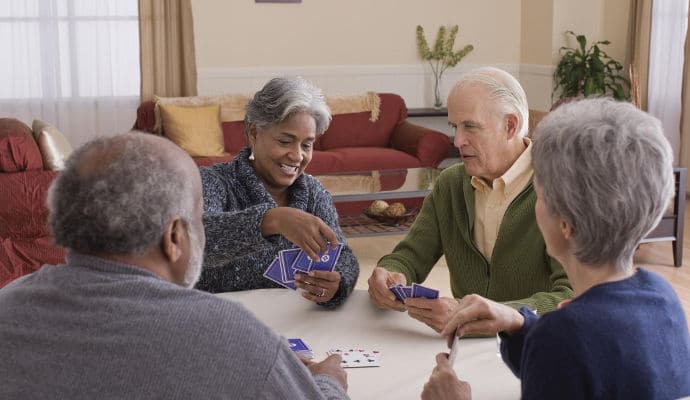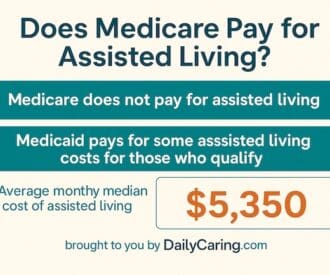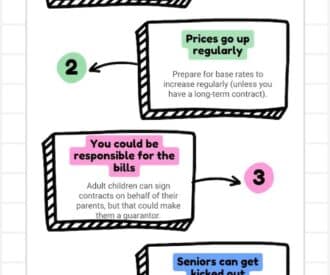
Loneliness has a bigger negative impact on senior health than many people realize. It can increase the risk of depression, poor nutrition, cognitive decline, and more. Fortunately, there are a variety of ways to prevent loneliness in seniors. Seniorly describes one way – how assisted living communities can improve overall health by increasing opportunities for socialization.
As we age, we often lose social connections along the way. According to Greater Good Science Center at UC Berkeley, we lose ‘social capital’ as we age – typically because of retirement, family members moving away, or losing family and friends to illness and death.
The natural reduction in daily social contacts has a negative impact on physical and mental health.
Fortunately, there are ways to improve this. Friendships and regular socialization improve overall health.
One study published in The Journals of Gerontology found that well-designed senior assisted living communities can maximize socialization, happiness, and quality of life. Providing your older adult with more opportunities to be social, like living in an assisted living community, may help them thrive.
The benefits of socialization for seniors
Being social is an important influence on senior health and well-being. Many studies have shown the positive effects of socializing for seniors, including:
Improved mental health
Aging adults often experience cognitive decline or the symptoms of depression. Studies show that more than 7 million seniors deal with symptoms of depression.
But additional studies show that consistent interaction with people helps reduce the risk of depression and dementia in older adults.
Better nutrition
Socialization may also improve nutrition for seniors. When seniors live alone, they’re more likely to suffer from malnutrition.
Friendly, lively social interactions can improve nutrition and overall health in older adults.
Improved physical health
A socially active life can also have additional health benefits – less physical pain, lower blood pressure, and even a boosted immune system.
Loneliness can increase health risks
According to Seniorly, some older adults who live at home may still be dealing with loneliness. Even with great in-home care, they may not be getting the amount of contact and communication they need.
Studies show that loneliness can increase health risks, with Forbes reporting that loneliness could be a bigger health risk than obesity or smoking, and another study showing that social isolation increased the risk of death by as much as 30%. Socially isolated seniors often experience higher mortality rates as well.
For many aging adults, the key to increasing socialization may be to attend an adult day program, move to an assisted living community, or consider another type of senior housing.
Assisted living communities help increase socialization
An assisted living community makes it easier for residents to socialize with their peers.
There are plenty of common areas where people can gather as well as structured activities like games, cultural events, dancing, field trips, and more.
The New York Times reported that levels of loneliness and social isolation are growing among seniors and it’s taking a toll on physical and mental health. The article notes that many elders benefited from living in retirement communities because of the shared activities, convenience, and larger number of potential friends with similar interests.
Recommended for you:
- 3 Tips to Help You Choose Between Assisted Living vs In Home Care
- Handy Checklist and Tips on How to Find a Good Assisted Living Facility
- How to Pay for Assisted Living: 6 Options
Guest contributor: Arthur Bretschneider is a 3rd generation senior housing operator and developer, and an MBA from the UC Berkeley-Haas School of Business. He lives in San Francisco with his wife and has two young boys. Arthur is the founder and CEO of Seniorly. Seniorly believes community is more than a place, it’s a way of life. Their mission is to connect our aging citizens to a community they will love.
Image: Creation Trust
This article wasn’t sponsored and doesn’t contain affiliate links. For more information, see How We Make Money.
About the Author
Seniorly
https://mashable.com/2016/09/15/seniorly-airbnb-assisted-living/, https://www.businesswire.com/news/home/20161003006590/en/Seniorly-Partners-Institute-Aging-Provide-Seniors-Comprehensive




